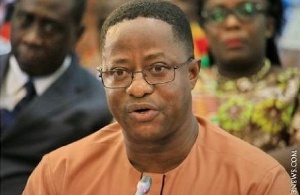 John Peter Amewu, Minister, Lands and Natural Resources
John Peter Amewu, Minister, Lands and Natural Resources
Government will spend about GHc500 million (US$150 million) in the next five years to implement the Multilateral Mining Integrated Project (MMIP). That's according to Minister of Lands and Natural Resources.
The project, which is expected to commence by the end of 2017, is estimated to cost GHc100 million annually.
The Minister of Lands and Natural Resources, John Peter Amewu, made this known on the sidelines of a National Validation Workshop on the MMIP in Tarkwa in the Western Region on Wednesday.
The five-year project has five components namely; review and enforcement of legal and regulatory regime, reclaiming degraded lands, dredged silted estuaries and waterways and free lands for agribusiness, and implement social interventions to facilitate livelihoods creation in mining communities.
It also involves adoption of appropriate technology to ensure efficient mining, processing, environmental and monitoring activities and capability building of artisanal small-scale miners, regulatory institutions and project management as well as communications.
The project document was developed government through the Ministry of Lands and Natural Resources, the Minerals Commission and the JFK Consultant.
Mr. Amewu, earlier in an address, said it would require sustainable and concerted efforts by all stakeholders, to effectively and efficiently resolve the phenomenon of illegal small-scale mining.
According to him, illegal mining was a multifaceted challenge and would not only rely on combative approach but adopt an integrated approach based on the lessons of previous initiatives working closely with various stakeholders.
The Minister said illegal mining had taken international dimension with Ivory Coast complaining about the effects of polluted water bodies having rippling effects on their lagoons and warned that if nothing was done to halt the menace, it would affect diplomatic relations between the two nations.
Mr. Amewu noted that government was not against mining but the methodology being used by some elements in the industry had resulted in unbridled destruction of the environment.
He urged traditional authorities, development partners, civil society organisations, mining associations, opinion leaders and all well-meaning Ghanaians to rally behind the government to halt galamsey once and for all.
"Ghana has been championing the implementation of the Sustainable Development Goals (SDGs) therefore we will not allow the activities of illegal mining to derail the gains made so far," he said.
He said mining contributed 16 per cent of the Ghana Revenue Authority's domestic tax collection in 2016 and small-scale mining alone contributed 31 percent of that revenue, saying mining was contributing significantly towards the socio-economic development of the nation.
There were syndicate group discussions on the various components of the MMIP to solicit stakeholders’ inputs into the project before its final implementation.
The meeting attracted key stakeholders including directors of Ministries Departments and Agencies, traditional authorities, civil society organisations, development partners, members of Parliament and the media.